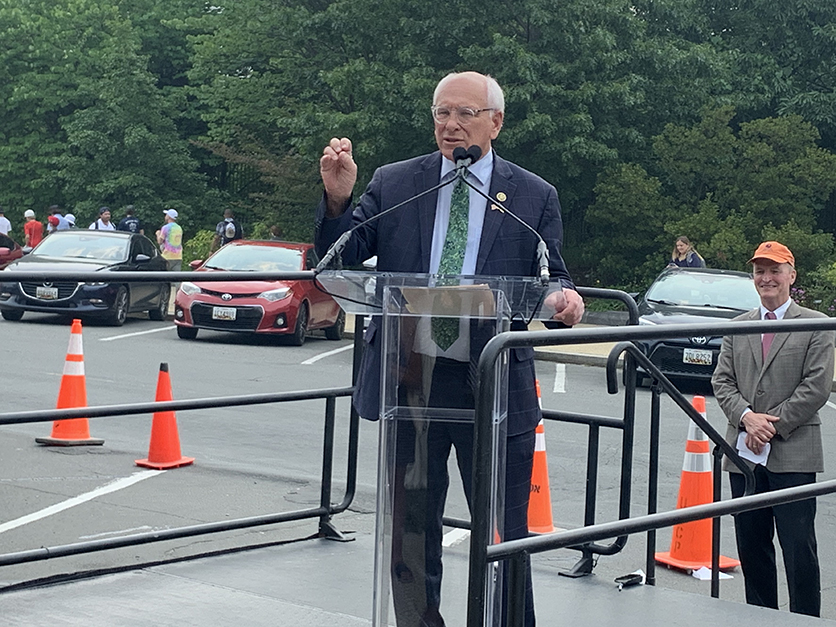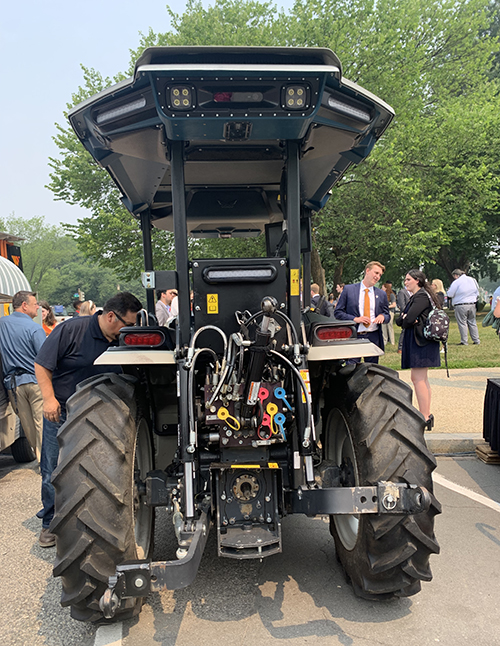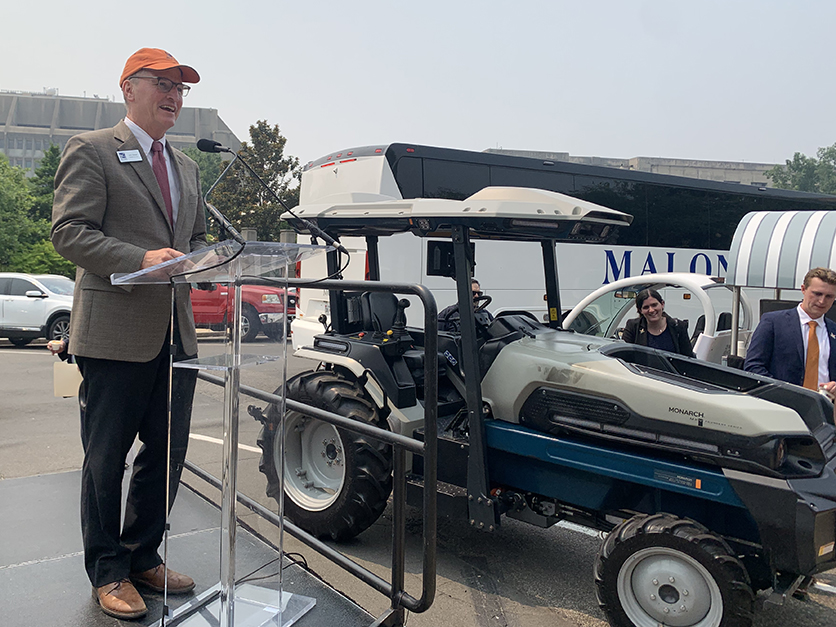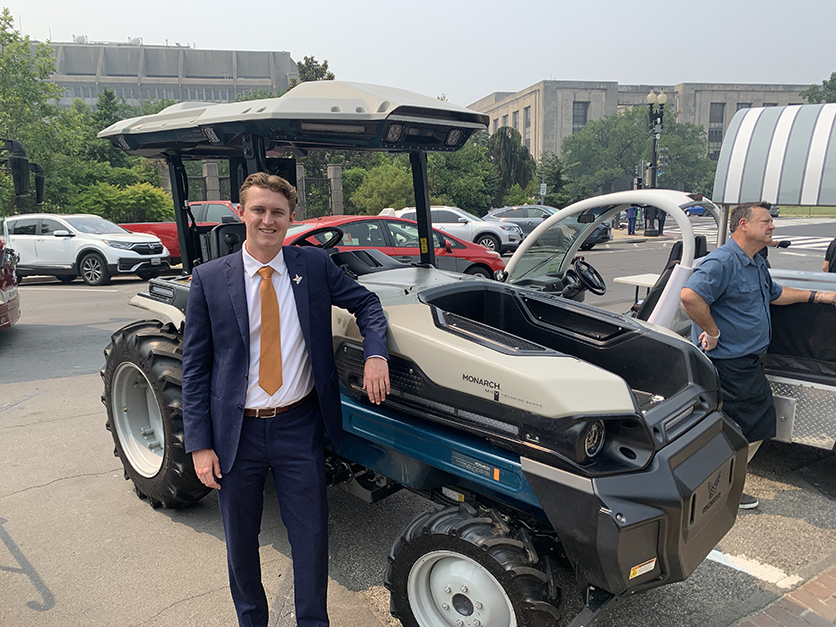Some electric tractors have hit the U.S. market, but it's not clear which federal incentive will be available to farmers looking to defray the high cost of the new machines.
A variety of medium and heavy-duty electric vehicles, including the compact all-electric Monarch MK-V Tractor, were brought to Capitol Hill earlier this month, where lawmakers took them for test drives and spoke to a crowd about the policies and investment needed to scale electric trucks and tractors for commercial and farm use.
With the Capitol in the background, legislators and clean energy industry experts applauded the Bipartisan Infrastructure Law and the Inflation Reduction Act for their historic investment in EVs.
“We used to talk about clean energy and innovation for the sake of reducing carbon emissions and greenhouse gas emissions as the future. It's the now,” said Rep. Paul Tonko, D-N.Y.
 Rep. Paul Tonko, D-N.Y., speaks on Capitol Hill about policies to advance electric vehicles Jokingly calling themselves the “mechanical engineers caucus,” Tonko and Sens. Alex Padilla, D-Calif., Martin Heinrich, D-N.M., stressed the need to scale the production of electric commercial vehicles — as loud diesel tour buses rolled past.
Rep. Paul Tonko, D-N.Y., speaks on Capitol Hill about policies to advance electric vehicles Jokingly calling themselves the “mechanical engineers caucus,” Tonko and Sens. Alex Padilla, D-Calif., Martin Heinrich, D-N.M., stressed the need to scale the production of electric commercial vehicles — as loud diesel tour buses rolled past.
One example of the potential for commercial EVs was the Monarch tractor that was on display. According to a company fact sheet, the MK-V offers about 40 continuous horsepower (with peaks of 70 hp) and is primarily designed for use in specialty crops.
“It thinks, kicks, and punches like an 80- or a 90-horsepower vehicle,” said Jake Winters, head of impact for Monarch Tractor.
Winters and the Monarch tractor both came from California for the event. The MK-V became commercially available last year, and Winters told Agri-Pulse the company's goal is to make it easy for farmers to adopt the equipment; it includes standard hookups like a three-point hitch and a hydraulic system.
 The Monarch MK-V electric tractor is made to be adaptable to existing farm equipment.
But can farmers afford it?
The Monarch MK-V electric tractor is made to be adaptable to existing farm equipment.
But can farmers afford it?
The Monarch MK-V costs $88,998, more than double the price of diesel compact tractors. Solectrac is another California company specializing in electric farm equipment. Their compact tractor is priced at $74,999, with the option to buy a $10,000 exchangeable battery pack and charger.
California farmers have the chance to tap into a state program that provides a voucher for the equipment cost. Nationally, Americans who buy electric cars can claim a tax credit.
But whether electric tractor purchases are eligible for existing tax breaks or federal grant programs remains unknown. Winters and others in the industry are hoping for clarity.
“This technology is here and it's commercially available. We're producing these units at scale. It's designed and built here in America and it's designed to make American farmers more profitable and more sustainable,” Winters said. “And this is all things that we can do now with the appropriate levels of public support.”
John Boesel is president and CEO of CALSTART, a California-based nonprofit working to advance clean transportation that organized the event on Capitol Hill. Calling itself a “market building organization,” the nonprofit aims to increase funding and opportunities for low- and no-emission transportation technologies.
“What I would like to see are incentives in the farm bill that help farmers purchase the charging equipment and maybe even getting incentives to purchase zero-emission tractors and trucks as well,” Boesel told Agri-Pulse.
Folks in rural communities interested in renewable energy projects can access loans and grants through USDA's Rural Energy For America Program (REAP) to deploy renewable energy projects like switching from diesel irrigation motors to electric; the IRA directed $2 billion toward REAP.
 CALSTART CEO John Boesel speaks on Capitol Hill about commercial and farm EVs. Lloyd Ritter worked on the first-ever energy title of the 2002 farm bill as a staffer for Iowa Democrat Tom Harkin, then the chair of the Senate Ag Committee. He now coordinates the Agriculture Energy Coalition for Green Capitol LLC, a policy advocacy organization focused on “clean energy investments in farm country.”
CALSTART CEO John Boesel speaks on Capitol Hill about commercial and farm EVs. Lloyd Ritter worked on the first-ever energy title of the 2002 farm bill as a staffer for Iowa Democrat Tom Harkin, then the chair of the Senate Ag Committee. He now coordinates the Agriculture Energy Coalition for Green Capitol LLC, a policy advocacy organization focused on “clean energy investments in farm country.”
Ritter told Agri-Pulse REAP currently only provides funds for EVs if they are an ancillary component of a larger renewable energy project — USDA's website specifically mentions switching from diesel to electric irrigation motors — so a farmer can't get government financial support for an EV tractor alone.
“We have not really investigated if electric tractors or electric vehicles would be eligible. I would think they would, we haven't really had a question yet for that,” said Mark Brodziski, deputy administrator of USDA's Rural Business-Cooperative Service. “The REAP program was issued in 2008. So of course at that time, there really weren't electric vehicles, charging stations, etc.”
Don’t miss a beat! It’s easy to sign up for a FREE month of Agri-Pulse news! For the latest on what’s happening in Washington, D.C. and around the country in agriculture, just click here.
Ritter said in addition to programs aimed at helping farmers access electric tractors, USDA should invest in research and development to better understand opportunities and applications for this new technology.
“EVs are a new thing for America and for farm country,” said Ritter. “Now's the time to look at these issues.”
Autumn Lankford, government relations manager for the Association of Equipment Manufacturers, which represents many of the nation's largest farm equipment companies, said the group's farm bill priorities include advocating for three pieces of legislation that would provide incentives for the adoption of precision agricultural technologies — some of which could include electric equipment.
She said equipment manufacturers are investing in research and development to better understand what is possible when it comes to electrifying farm equipment.
Winters, the Monarch Tractor employee, noted the company is awaiting Internal Revenue Service guidance on whether or not an existing tax credit for electric vehicle purchases could be expanded to electric tractors, but there is a “positive indication” it may become available.
Ritter acknowledged incentives to scale electric tractors and farm equipment should mirror what exists for cars.
“We need to provide opportunities for rural America and farmers — just as we're doing for other Americans via, for example, the tax code on EVs,” said Ritter. “And perhaps the farm bill this coming round should look into this issue.”
Similarly, the Inflation Reduction Act provided $1 billion for the Clean Heavy-Duty Vehicles and Clean Ports Program, intended to help replace heavy-duty vehicles with zero-emission vehicles. But whether the policy applies to electric tractors is again, unclear.
 Jake Winters is Head of Impact for Monarch Tractor.
Winters said until the EV tax credit is clarified, farmers' best option for financial support is the NRCS Combustion System Improvement Program — which allows producers to scrap a diesel tractor and get a small amount of funding to replace it with a more efficient model as part of a larger conservation plan.
Jake Winters is Head of Impact for Monarch Tractor.
Winters said until the EV tax credit is clarified, farmers' best option for financial support is the NRCS Combustion System Improvement Program — which allows producers to scrap a diesel tractor and get a small amount of funding to replace it with a more efficient model as part of a larger conservation plan.
California, where Monarch is based, has a voucher program for farmers to purchase electric tractors. Producers who participate in the state program can receive an incentive ranging from $13,000-$75,000. The company is advocating for this approach to be scaled nationwide.
Manufacturers like Monarch have also realized that coupling electric tractors with autonomous technology draws a more engaged market in California, where labor costs and shortages are driving more agricultural technology solutions. But Monarch has faced fierce labor pushback in petitioning the state’s workplace safety regulator to ease restrictions on driverless tractors. The state’s stringent climate mandates are also pressuring farmers to find creative approaches to adopt emerging EV technologies.
Winters said the “biggest hurdle” to mass adoption of electric farm equipment is finding and implementing programs to help producers offset the upfront costs but “the conversations are starting to happen” among policymakers, stakeholders and farmers.
“These folks that bring us the food that we eat have immense challenges ahead of them,” said Winters. “These types of new technologies and the off-road equivalents … are some of the most advanced and cutting-edge pieces that we can give our nation a supercharge, and decarbonize our food ecosystem in a way that we had never thought possible, even 25 or 30 years ago.”
For more news, go to www.Agri-Pulse.com.


